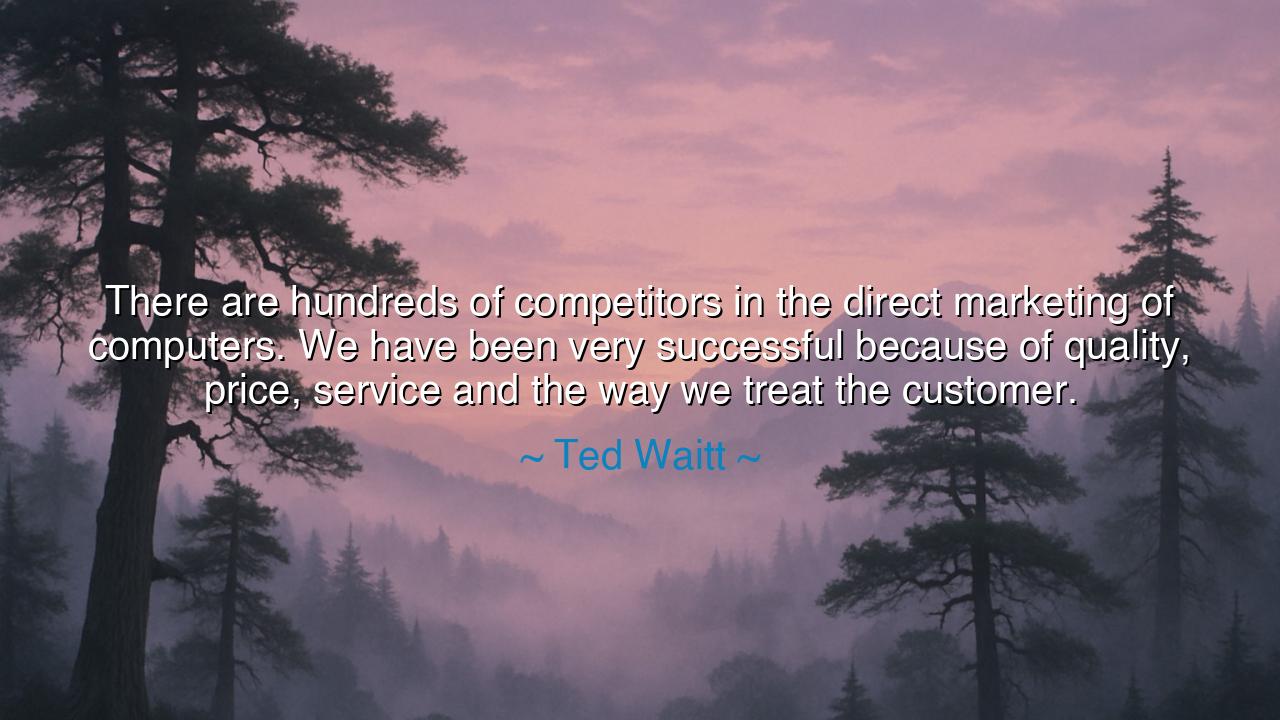
There are hundreds of competitors in the direct marketing of
There are hundreds of competitors in the direct marketing of computers. We have been very successful because of quality, price, service and the way we treat the customer.






In the words of Ted Waitt, “There are hundreds of competitors in the direct marketing of computers. We have been very successful because of quality, price, service and the way we treat the customer.” These words, spoken from the perspective of one who has witnessed the rise of a company in a crowded and competitive marketplace, reveal the timeless truth that success is not simply about having the best product, but about understanding the fundamentals of service, value, and relationship. In the world of commerce, as in life, it is not enough to merely exist or to offer something of worth; one must also connect with others, treat them with respect, and deliver upon promises made.
In the ancient world, wise rulers and leaders understood the delicate balance between the needs of their people and the way in which those needs were met. King Cyrus the Great, who founded the Persian Empire, was revered not only for his military conquests but also for his treatment of those he governed. He was known for his fairness, wisdom, and for extending a hand of understanding to different peoples, a rare virtue in his time. Similarly, Waitt’s philosophy of customer service and quality mirrors this ancient understanding: a leader, whether in business or life, must be attuned to the needs of others, and must meet those needs with more than just skill—they must meet them with heart.
Think, too, of the story of Alexander the Great, who, though an unparalleled military strategist, understood the importance of human connection. After his conquest of Persia, he sought not just to defeat, but to win the trust and loyalty of the people he ruled. It was not enough to simply conquer—he had to foster relationships, to build a lasting connection with those who would live under his reign. In his treatment of the people he conquered, Alexander demonstrated a fundamental truth: lasting success is built upon the foundation of mutual respect and understanding. He was not just a conqueror; he was a leader who listened and treated others with the dignity they deserved.
Leaders and great figures throughout history have known that true success is not achieved by simply having a superior product or service, but by the way in which you relate to those around you. Waitt’s emphasis on the way we treat the customer reveals a fundamental insight into human nature: people do not remember what you sell them as much as they remember how you made them feel. A product may fade, a service may expire, but the memory of a generous and respectful exchange lingers long in the hearts of those you serve.
The ancient Greeks had a concept known as philanthropia, which referred to the love of humankind and the duty to act with kindness and generosity toward others. This concept was central to their understanding of the good life. It was through acts of service and generosity that a person could achieve a kind of immortality in the memories of others. In today’s world, Waitt’s philosophy aligns perfectly with this ancient ideal: offering more than just a product or service, but offering a genuine commitment to the well-being of the customer, to their satisfaction, and ultimately, to their trust.
Consider the story of Steve Jobs, the founder of Apple, who revolutionized the tech industry not just through the innovation of the iPhone, iPad, and MacBook, but through his intense focus on user experience. Jobs understood that people did not merely want gadgets; they wanted something that would enhance their lives in meaningful ways. He and his company built relationships with customers, not simply by creating cutting-edge products, but by offering something more profound: a sense of belonging, an experience that made people feel that their needs were understood and met in a way that no competitor could match. This was not merely about the products themselves—it was about the relationship Apple built with its customers.
Waitt’s wisdom in emphasizing quality, price, service, and the way in which a company treats its customers transcends the realm of business and speaks to the nature of human connection itself. The lesson is clear: success is not just about the competition or the mere transaction; it is about building lasting relationships founded on respect, understanding, and a commitment to the welfare of those you serve. In life, as in business, it is not enough to simply offer something of value—it is how you offer it and who you are in the exchange that matters most.
Let this be the guide for you, whether in business, relationships, or personal endeavors: seek to offer more than just what is expected. Give people something they can cherish, not just a product or service, but an experience of respect, care, and understanding. Offer quality that surpasses the ordinary, provide service that exceeds their expectations, and always, always, treat others as you would wish to be treated. In doing so, you will build something far more lasting than any product or transaction—you will build a legacy of trust.






AAdministratorAdministrator
Welcome, honored guests. Please leave a comment, we will respond soon